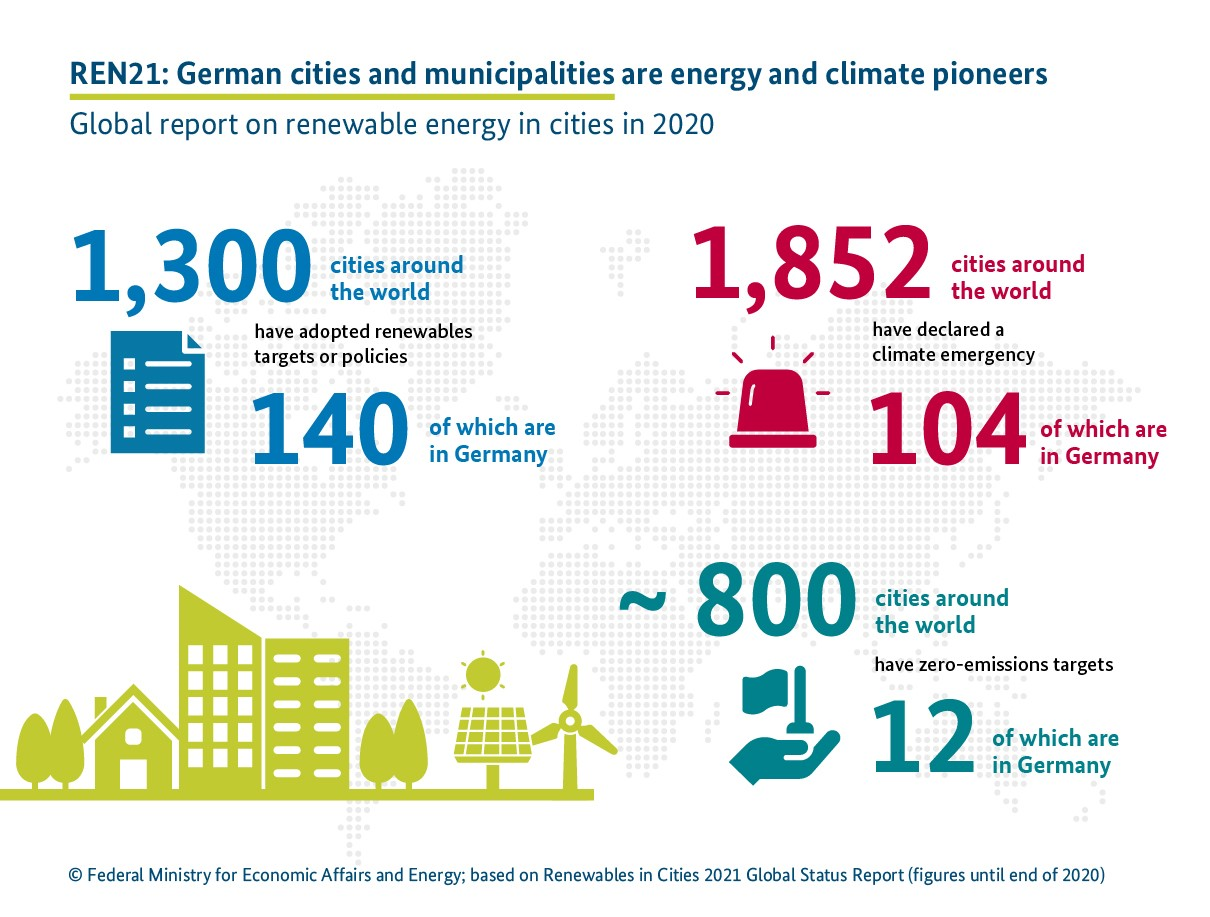REN21 report: Cities have a major impact on the global energy transition
Cities can play a key role in climate change mitigation. This is the message of REN21’s current report on renewable energy in cities. According to the study, Germany boasts roughly 11% of all cities worldwide with renewables targets.
 © Federal Ministry for Economic Affairs and Energy, based on Renewables in Cities 2021 Global Status Report (figures until end of 2020)
© Federal Ministry for Economic Affairs and Energy, based on Renewables in Cities 2021 Global Status Report (figures until end of 2020)
Already more than a billion people are living in cities which have set themselves renewable energy targets or are pursuing related policies. This is the finding of this year’s issue of the 'Renewables in Cities Global Status Report', which was published in March. The report is produced by REN21 – a global network in the field of renewable energy that brings together stakeholders from the science community, government, intergovernmental organisations, NGOs and industry. For the second time already, REN21 has investigated how cities are using renewable sources of energy to cut emissions and mitigate climate change. Numerous German cities have been awarded good grades.
REN21: Cities represent a major opportunity for a renewable future
As Rana Adib, REN21’s Executive Director, sums up: "With their impact at scale, cities are our best bet to plan, develop and build a renewable future." The great potential cities offer for the global energy transition was also highlighted by Ban Ki-moon, the eighth Secretary-General of the United Nations. He believes that although cities across the world are responsible for a wide range of sustainability issues, they also provide numerous solutions. As Rana Adib adds, "cities must transition to renewables and set end dates for fossil fuels in all sectors. Cities like Hamburg, San Francisco and Shanghai show: the more ambitious they are, the more they think of renewable energy everywhere."
The country figures provided by the Renewables in Cities Global Status Report attest to the global pioneering role of German cities when it comes to energy and climate policy. In fact, a total of 140 cities in Germany have set themselves a renewables target or adopted a renewables policy. These 140 cities are home to around 25.5 million people, or roughly 40% of Germany’s urban population. Globally, only 1,300 cities have set themselves such targets.
A commitment to more climate action: climate emergency declarations in an increasing number of German cities
An increasing number of cities, municipalities and even entire nations are declaring what has become known as a 'climate emergency'. In doing so, they are giving greater priority to climate change mitigation efforts. The aim is, for example, to speed up the implementation of packages of measures on emissions reduction and similar projects. By 2020, 104 German cities had declared a climate emergency – as against 98 cities in 2019. Across the globe, a total of 1,852 cities had taken such a measure by 2020.
The urban energy transition is creating jobs, quality of life and a better health situation
The Renewables in Cities 2021 Global Status Report also shows that emissions reductions are not the only way cities benefit from taking control of their energy future: an important finding is that the urban energy transition also leads to the creation of jobs, a higher quality of life and improvements in the health situation. In Germany, the report observes a trend in an increasing number of cities towards mandatory solar thermal systems and rooftop PV installations in new buildings. Also, it shows that political commitment at national and regional level – for instance in the form of targeted funding programmes – has been key to the roll-out of renewables in cities.
More measures for renewable heating technologies and in the transport sector
According to the experts of REN21, further action needs to be taken in order to convert cities to climate-friendly heating technologies. Although an increasing number of German cities are now supporting renewable sources of heat (primarily solar-based), renewables currently account for only 16% of district heating. As the experts point out, the transport sector, too, needs to catch up, with less than 6% of German road traffic being powered by renewable energy.

